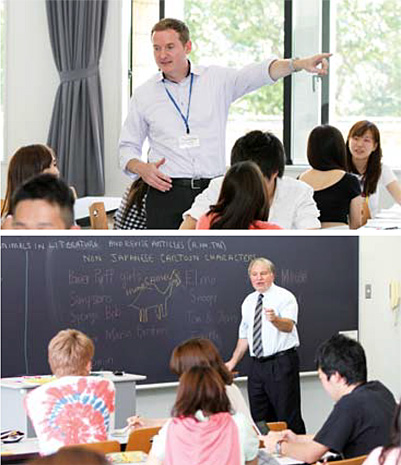- 2025年度 授業要覧 地球社会共生学部
- MENU -
CURRICULUM 学びの特色とカリキュラム
4つの専門領域が可能にしたオーダーメイドの学び
「共生」をキーワードに、コラボレーション領域、経済・ビジネス領域、メディア・空間情報領域、ソシオロジー領域の4つの専門領域であなたの学びを深めていきます。
このような社会科学4領域の幅広い素養を身につけ、それらを複合的に学ぶことを通して、地球規模の視野で地球社会の多様性を認識する力を身につけていきます。
目標に合わせて柔軟に科目を選択できるカリキュラム
地球社会共生学部は社会科学分野を基礎とするグローバル学部です。カリキュラムは、政治学、経済学、経営学、メディア、空間情報学、社会学という社会科学系の学問分野から成っています。自分の興味や目指す進路に応じて、学びたい授業を選べるオーダーメイド型を採用し、各専門領域の科目を組み合わせることで、学生オリジナルのカリキュラムが完成します。

ENGLISH EDUCATION 英語教育

コミュニケーションツールとしての英語の習得を目標に、インテンシブかつアカデミックな英語教育を展開しています。
留学のためには英語能力が求められますが、GSCでは留学のためだけではなく、留学も含めた大学の4年間を通して英語能力の向上に取り組んでいます。
まず、留学に必要な英語の4技能「聞く・話す・読む・書く」を徹底して習得するために、一年次は10段階のレベル別に分かれた少人数クラスで、ネイティブ講師による授業「Academic English Ⅰ・Ⅱ」(必修)が週6コマ(90分/回)行われます。
留学の出願に必要な英語資格試験(IELTS)のスコアを上げるために、4技能を高めることを主目的とした授業内容です。また、学生は本学部の補助にて2回のIELTS試験を受験することができ、自分の英語力を確認することができます。
留学前の2年次前期には、留学先大学で英語の授業に対応できるよう、ディスカッション能力やレポート作成能力、英文読解力などのアカデミックスキルを高める授業「Academic English(Applied Skills)」(必修)が週4コマ(90分/回)行われます。
そして留学後、進学や就職などに向けてさらに英語力に磨きをかけたい学生は、2年次以降に配置されている専門的な英語能力を強化するワークショップを履修することができます。

徹底した英語資格テスト対策
一年次前期のうちに学部留学に必要な英語資格スコアの取得をめざします。テストに不安をもつ学生のために、課外授業として対策講座も設置し、多くの学生が受講しています。
-
IELTS
海外留学や海外移住で必要な英語力を判断するための英語資格テストのひとつです。1年次前期には本学部生全員を対象にテストを実施し、2年次後期の学部留学に求められるスコアの取得をめざします。
-
TOEIC®
英語によるコミュニケーション能力を幅広く評価する世界共通のテストです。本学部生全員を対象に入学時、1・3年次の終わりにテストを実施し、英語力の伸びを確認しています。入学時から1年間でTOEIC®100点アップを目標にしています。
COURSE MODEL 履修モデル
「共生」をキーワードに、コラボレーション領域、経済・ビジネス領域、メディア・空間情報領域、ソシオロジー領域の4つの専門領域の履修モデルをご紹介いたします。
※ここで紹介する履修モデルは、あくまでも一例です。
コラボレーション領域
世界各国の経済・社会発展の状況、文化、社会の多様性、そして国家のみならずさまざまな主体間の関係性を理解した上で、格差拡大や地球環境問題、紛争・難民問題といった地球規模課題にどのように取り組めば良いのか、異なるバックグラウンドを持つ人々が地球上で共存、共生できるような社会の実現をどのように実現していくのかなど、世界の人々との協働のあり方や国際協力の可能性を探っていきます。
経済・ビジネス領域
さまざまな経済現象の仕組みや、経済諸問題の原理および解決方法、また企業の行動原理や実態を学びます。多様な背景をもつ人々がいる職務環境の中で、人々と協働し、お互いの個性、能力、経験を生かして企業や社会に貢献できるビジネスパーソンを養成します。
メディア/空間情報領域
≪メディア≫ メディアが歴史的に果たし、また今日担っている役割について学び、メディアに関わる倫理や知的財産などを理解することで、責任あるメディア人になるためのメディア・リテラシーを身につけます。また、実際にニュースが生成される過程や、取材、インタビュー、ニュースライティングの手法などを体験的に学び、情報を伝達・発信する力を養います。
≪空間情報≫ どこで災害が発生しているか、どこで違法森林伐採が行われているか、どこから難民が移動しているかなど、どこで事象が生起しているかという情報、すなわち空間情報は、地球問題の解決や、社会科学的分析で不可欠な情報です。空間情報領域では、空間情報の系統的な取得→管理→分析→伝達の方法を学びます。この方法は他の領域でも活用できる基盤的方法です。
ソシオロジー領域
政治や宗教、教育や家族、文化など、様々な側面から社会に光を当て、なぜ、どのように社会が形成されているのかを考えます。そして、社会や異文化を理解するための基礎理論および実証的な研究方法を学び、複眼的かつ多面的に、現代世界の諸課題や展望を把握し分析する力を身につけていきます。
SUBJECT 主要科目の特長
地球社会共生学部ではどのような授業が行われるのでしょう。それぞれの領域から計24科目を紹介します。(2019年度入学者対象の科目内容です)
コラボレーション領域
-
国際協力論入門
現代では開発協力や平和のための協力など、様々な目的から国際機関や政府、NGO/NPOが国際協力を行っています。なぜ、こうした国際協力が必要なのでしょうか。この授業では、いろいろな事例を参照しながら、国際協力の全体像や今後の課題、可能性を学びます。
-
社会・人間開発論
経済的な豊かさだけが発展ではありません。貧困や格差、社会の分断、援助依存の問題に取り組むには、どのような開発を進めるべきなのでしょうか。この授業では、教育や保健などの生活の質に関わる分野を中心に、地域や民族の固有性、人々の主体性、行政と地域の協働について考えます。
-
東南アジア地域社会論
経済発展とグローバリゼーションの進展によって東南アジアは近年ドラスティックに変化しています。この授業では東南アジアの変化の中心である、それぞれの国の都市空間を、「グローバリゼーション」「消費社会」といった切り口から見つめ直します。
-
紛争・難民・平和構築
世界では未だに各地で紛争が絶えません。紛争はなぜ起きるのでしょうか。どのように解決すれば良いのでしょうか。この授業では国際紛争学の理論と歴史を学ぶだけでなく紛争の原因分析や紛争解決のプロセス、平和構築の状況を分析し、その課題や可能性を討論します。
-
多文化共生論
「共生」を実現させるために必要となるのが、異なる文化や価値観の理解です。この授業では異なる文化を哲学、歴史、民俗学といった多角的な視座から捉え直し、国内外における「多文化共生」の事例などを研究して、共生・共創のための道筋を追究します。
-
スポーツとコミュニティ
「スポーツ」は人と人との関係を結ぶうえでどのような役割を果たすのでしょうか。この授業では国内外の事例を引用して実証的な研究を行います。国際的に活躍した経験のあるスポーツ選手を講師として、その経験をベースに「スポーツ」が果たすべき役割を学びます。
経済・ビジネス領域
-
国際経済学
経済をひとつの国で完結させず、複数の国の相互関係として扱うのが国際経済学です。多国モデルでの国民所得の決定を説明するマンデル・フレミングモデルの理論や為替レートの決定を説明する国際金融論など、この授業では理論的側面に焦点をあてて解説します。
-
国際金融論
この科目では、グローバルなビジネスや国際貿易を行う際に、実際に使える金融の仕組みや基本的な理論について学びます。特に海外でのビジネスに欠かせない為替レートの仕組みや、さまざまな工業製品・農産物・サービスの貿易取引とマネー(ファイナンス)の関係などを理解します。
-
国際経営戦略論
海外でのビジネスを成功させるためには何が必要なのでしょうか。この講義では多国籍企業における海外経営戦略について論じるとともに、国際経営戦略の市場的要因(市場の需要など)と非市場的諸要因(制度や文化)について、国内外の事例をもとに学びます。
-
ツーリズムマネジメント
国際的な観光産業は国にとっても重要な輸出産業です。授業では「観光地」「観光情報」「移動手段」「観光者」といった観光に関わる要素をどのようにマネジメントすれば地域活性化につながるのか研究し、観光がもたらす効用と現況を学びます。
-
経営組織論
経営組織論とは、経営学の中心となる科目の一つです。この授業では、組織の中での人間行動、協働することの原理や仕組み、組織マネジメントなどの理解を通じ、戦略論に対応させながら、現実の経営組織の特質や問題点を学びます。
メディア/空間情報領域
-
情報インパクト論入門
情報とそれを伝えるさまざまなメディアの出現は、社会に大きなインパクトを与えてきました。この授業では、新聞、写真、音楽、ラジオ、テレビなどのメディアの歴史をたどりつつ、情報やメディアと社会の関係を先人がいかに考えてきたのか、その学説を学びます。
-
メディアの法律と倫理
この授業は大きく、2つのパートに分けられます。第1部では、表現の自由、名誉棄損、プライバシー権、パブリシティ権、情報公開法、著作権といったメディアに関連する法律を学びます。第2部では、生命か報道か(たとえば「取材ヘリは被災者を助けるべきか」など)、実名報道などのメディアの倫理についてディスカッションを交えつつ、考察します。
-
インタビュー演習
この授業では、まずインタビューの基礎、理論を学びます。さらにインタビューを実施する側、インタビューを受ける側の両面を体験し、実践から習得していきます。インタビューを通して異文化間でも情報を得るために必要な英語やジェスチャーも学びます。
-
空間情報システム入門 Ⅰ
地理情報システム(GIS)とは何か知っていますか。これは地理的位置と、その位置に関する情報を持ったデータを管理・加工し、高度な分析を可能にする技術のことです。この授業ではGISの概念と全体像を理解し、地図の作法を実践します。
-
空間情報システム入門 Ⅱ
世界で通じる空間情報の活用方法を学びます。住所体系の異なる国同士での位置情報の受け渡しや、地図情報が整備されていないエリアでの対応方法などを学び、さまざまな状況で制限を受けやすい海外でも通用する空間情報コミュニケーションの技術などを学びます。
-
空間情報の表現技術
この授業では手に入れた空間情報をGISという地理情報システムを使い、可視化するための技術を学びます。いくつかの空間情報を組み合わせる方法や、単一のデータに更なる付加価値を付ける方法など、魅力的な空間表現技術を広く学習します。
-
空間分析
この授業では、地球上の「どこで」「何が」起きたのかをどのように分析するのか、その方法を学びます。統計的な分析を行う力は各種の社会科学に活用できる力です。授業では最初に入門編として空間統計の基礎概念を解説し、その後、基本的な統計の手法を学びます。
ソシオロジー領域
-
社会学入門
社会学は、社会現象の実態や、なぜその現象が起きたのかを解明するための学問です。ここでは社会的事実の収集方法や分析方法を学び、社会を見る眼を養い、家族問題などの日本社会の現実分析を交えながら具体的な社会現象を把握する応用を学びます。
-
グローバリゼーションの社会学
グローバリゼーションとは国家や地域などの境界線を、人、モノ、カネ、情報が乗り越えていく動きのことです。この授業では近年のグローバリゼーション研究の動向を紹介し、現在進行中の政治・経済・社会・文化の変容を追跡し、そこで起こる諸問題を検討します。
-
政治の社会学
政治というと、選挙や国会、政府の活動を思い浮かべるかもしれません。しかし家族・学校・会社でも、実はいつも権力と支配、対話と協力といった営みは生じています。この授業では、そうした「社会のなかの政治」を読み解くための理論的視点を学んでいきます。
-
共生の社会学
グローバル化が進み、国際的な流動性が高まるとともに、多様性を基盤とした社会の構築が求められています。この授業では、教育における研究の動向と事例、諸問題を紹介し、共生をめぐる社会構築の可能性を探ります。
-
文化の社会学
「文化」はその概念も捉え方も、時代とともに変化してきました。この授業では、文化を研究する際の対象と方法の変遷を、歴史的・政治的・社会的変化と関連づけながら追うとともに、いくつかの具体的トピックスを取り上げて、複眼的な観点からそれらを分析する方法を学びます。
-
現代社会論
21世紀に入り、世界では多極化を志向するナショナリズムなどが台頭しています。この状況の中、異文化同士が共生可能な社会について改めて考えねばなりません。この授業では、社会思想の諸潮流を学ぶとともに、現代社会が直面する問題を展望し、その解決方法を探ります。
